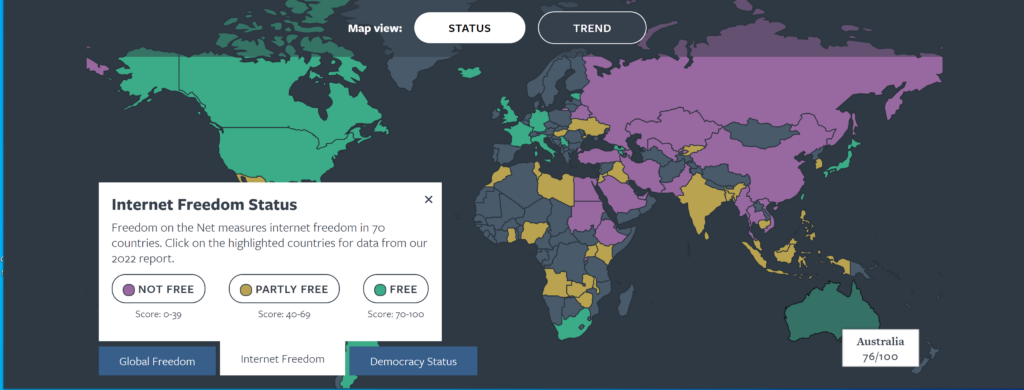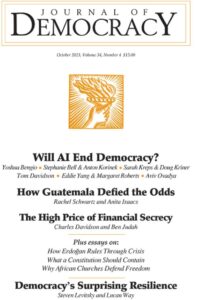
Freedom House
WHEN YOU ASK ChatGPT “What happened in China in 1989?” the bot describes how the Chinese army massacred thousands of pro-democracy protesters in Tiananmen Square. But ask the same question to Ernie and you get the simple answer that it does not have “relevant information.” That’s because Ernie is an AI chatbot developed by the China-based company Baidu, Freedom House report co-authors Allie Funk, Adrian Shahbaz, and Kian Vesteinsson write for The Wire.
Global internet freedom declined for a thirteenth consecutive year in 2023, partially as a result of artificial intelligence being used to sow disinformation and enhance content censorship, according to Freedom on the Net 2023: The Repressive Power of Artificial Intelligence, a new report from Freedom House, TIME reports:
The 2023 Freedom on the Net report, published on Oct. 4, assesses the state of internet freedom in 70 countries through a comprehensive methodology examining obstacles to access, limits on content, and violations of user rights. The report found that many countries—including Myanmar, the Philippines, Costa Rica—have drastically restricted online freedoms this year. China has the lowest levels of internet freedom for the ninth consecutive year, the report said.
“AI can be used to supercharge censorship, surveillance, and the creation and spread of disinformation,” said Michael J Abramowitz, president of Freedom House. “Advances in AI are amplifying a crisis for human rights online.”
 Key Findings
Key Findings
- Global internet freedom declined for the 13th consecutive year. Digital repression intensified in Iran, home to this year’s worst decline, as authorities shut down internet service, blocked WhatsApp and Instagram, and increased surveillance in a bid to quell antigovernment protests…
- Attacks on free expression grew more common around the world. In a record 55 of the 70 countries covered by Freedom on the Net, people faced legal repercussions for expressing themselves online, while people were physically assaulted or killed for their online commentary in 41 countries. …
- Generative artificial intelligence (AI) threatens to supercharge online disinformation campaigns. At least 47 governments deployed commentators to manipulate online discussions in their favor during the coverage period, double the number from a decade ago. Meanwhile, AI-based tools that can generate text, audio, and imagery have quickly grown more sophisticated, accessible, and easy to use, spurring a concerning escalation of these disinformation tactics…..
- AI has allowed governments to enhance and refine their online censorship. The world’s most technically advanced authoritarian governments have responded to innovations in AI chatbot technology, attempting to ensure that the applications comply with or strengthen their censorship systems. Legal frameworks in at least 21 countries mandate or incentivize digital platforms to deploy machine learning to remove disfavored political, social, and religious speech. AI, however, has not completely displaced older methods of information control….
- To protect internet freedom, democracy’s supporters must adapt the lessons learned from past internet governance challenges and apply them to AI. AI can serve as an amplifier of digital repression, making censorship, surveillance, and the creation and spread of disinformation easier, faster, cheaper, and more effective.
 There are two major drivers of the trend of the last decade, says Funk, research director for technology and democracy at Freedom House:
There are two major drivers of the trend of the last decade, says Funk, research director for technology and democracy at Freedom House:
- First is the broader decline in democracy, also tracked by Freedom House.
- Second, is “the success of the Chinese government in being able to export its model of cyber sovereignty abroad.”
In a new special package on AI and democracy, top experts weigh in on what a fast-developing technology that promises superhuman intelligence means for humanity and the political life that governs us, The Journal of Democracy reports:
“While AI has a lot of these really exciting uses for society, for medicine, its uptake is really increasing the scale and the efficiency of digital repression. And you see that with surveillance, censorship and disinformation,” Funk told VOA.
The hope was that chatbots would mirror the promise of social media from a decade ago by allowing people to circumvent state-controlled information and access uncensored material. Instead, “more governments are going to be interested in controlling chatbots and their output,” Funk said. RTWT
“AI can be used to supercharge censorship, surveillance, and the creation and spread of disinformation,” said @freedomhouse president @abramowitz. “Advances in AI are amplifying a crisis for human rights online.” https://t.co/yXpQkfGWdF via @scmpnews
— Democracy Digest (@demdigest) October 4, 2023







